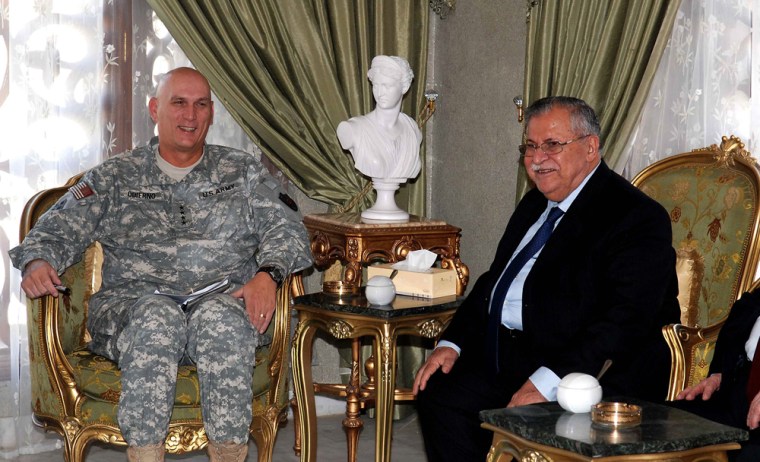Iraq’s prime minister said in remarks aired Friday that the top U.S. commander in Iraq “risked his position” by alleging Iran was trying to bribe lawmakers to vote against the proposed security agreement with the United States.
Prime Minister Nouri al-Maliki briefed top political leaders Friday about the draft agreement, which includes a timeline for U.S. withdrawal from Iraq by the end of 2011 and a compromise giving Iraq authority to try U.S. contractors and soldiers for major crimes committed off-duty and off-base.
A government statement said the same group — including President Jalal Talabani, the two vice presidents and leaders of parliament — would meet again in a few days, suggesting some people raised objections.
One lawmaker who attended the meeting said there were discussions for and against the draft and that two Shiite parties boycotted the session. He spoke on condition of anonymity because the discussions were confidential.
“There were thorough and important comments,” presidential spokesman Nasser al-Ani said. “To the political and national blocs, the agreement remains in the phase of analysis and study.”
In an interview published Monday in the Washington Post, Gen. Ray Odierno, who took command of the U.S.-led coalition last month, said U.S. intelligence reports indicated Iran has tried to bribe Iraqi lawmakers to derail the agreement, which must be approved by parliament before the U.N. mandate expires at the end of the year.
“The American commander has risked his position when he spoke in this tone and has regrettably complicated relations,” al-Maliki told visiting Kuwaiti journalists Thursday. “How can he speak like this about a baseless allegation? What has been said is truly regrettable.”
Odierno and U.S. Ambassador Ryan Crocker met Talabani on Friday and al-Ani, the presidential spokesman, said he understood that Odierno has offered an apology.
Unusually sharp tone
The U.S. military did not immediately respond to a request for comment.
The unusually sharp tone of al-Maliki’s remarks, aired Friday on Iraqi television, underlined the political sensitivities of both the draft agreement and Iraq’s relations with Iran, which opposes the deal.
Many Shiite politicians lived in exile in Iran when Saddam Hussein was in power, returning home after the 2003 ouster of his Sunni-led regime. They include many of the lawmakers al-Maliki needs to ratify the agreement.
Al-Maliki’s aides say the prime minister will hold a series of consultations before submitting the draft to parliament in order to measure public opinion and build political support for the pact. The Shiite leader could be politically isolated if he tries to win parliament’s backing in the face of widespread opposition.
During the meeting with Kuwaiti journalists, al-Maliki said he had shown the full text to national leaders “with its positives, weaknesses and negatives” — a tacit acknowledgment that Iraq didn’t get everything it wanted in the tortuous negotiations.
Al-Maliki did not elaborate but said his consultations showed he wanted to decide on the draft accord “through national consensus.”
But several Sunni and Shiite clerics, who wield considerable influence in shaping public opinion, spoke out Friday against the draft, complaining that the Iraqi public knows little about the terms.
“The agreement that is supposed to be signed between Iraq and the U.S. is more dangerous than the occupation,” Sheik Abdul-Sattar Abdul-Jabar told the congregation in Baghdad’s Abu Hanifa mosque, the most prestigious Sunni shrine in the capital.
“It is illegal and the government should not sign it,” Abdul-Jabar said. “The government should get the approval of the Iraqi people through a popular referendum.”
At another Baghdad mosque, Shiite cleric Sadralddin al-Qubanji criticized the secrecy that surrounded the months of negotiations with the Americans.
He said the agreement “might be negative or positive” and called on the government to do a better job informing the public about the details.
“There is no national unanimity about it,” al-Qubanji said.
Al-Qubanji’s noncommittal remarks were significant because he is associated with the Supreme Islamic Iraqi Council, the biggest Shiite party and al-Maliki’s partner in the government. It holds 30 of the 275 seats in parliament that al-Maliki needs to ensure a strong majority vote on the agreement.
But the Supreme Council has not announced a stand on the agreement, a move party members say was designed to distance it from the prime minister in case the deal meets significant opposition.
Key council leaders have close ties to Iran.
Opponents plan mass rally
The political movement loyal to anti-U.S. Shiite cleric Muqtada al-Sadr, which also holds 30 parliament seats, has come out strongly against the agreement and plans to hold a mass rally Saturday in the capital’s Sadr City district to reinforce that message.
During a sermon Friday in Najaf, al-Sadr aide Sheik Assad al-Nasseri said the demonstration would demand “the occupier leave Iraq unconditionally.”
Al-Nasseri said the Sadrists would continue to oppose the deal “whatever the concessions that the government claims to have gotten.”
A copy of the draft, obtained by The Associated Press, shows that the Iraqis won some major concessions, including a date for the U.S. troop withdrawal but with the provision that the government could ask for some soldiers to stay for training and support.
The U.S. also said the Iraqis could get first crack at prosecuting soldiers and contractors accused of serious, premeditated crimes off base and while not on duty. It was unclear whether many Americans would fall under those categories in a combat zone where movements are restricted.
American troops would not be allowed to search homes or hold detainees without a warrant from an Iraqi court.
Meanwhile Friday, a suicide bomber killed a prominent Sunni mosque preacher, Sulaiman al-Jamaili, in Fallujah, police said.
